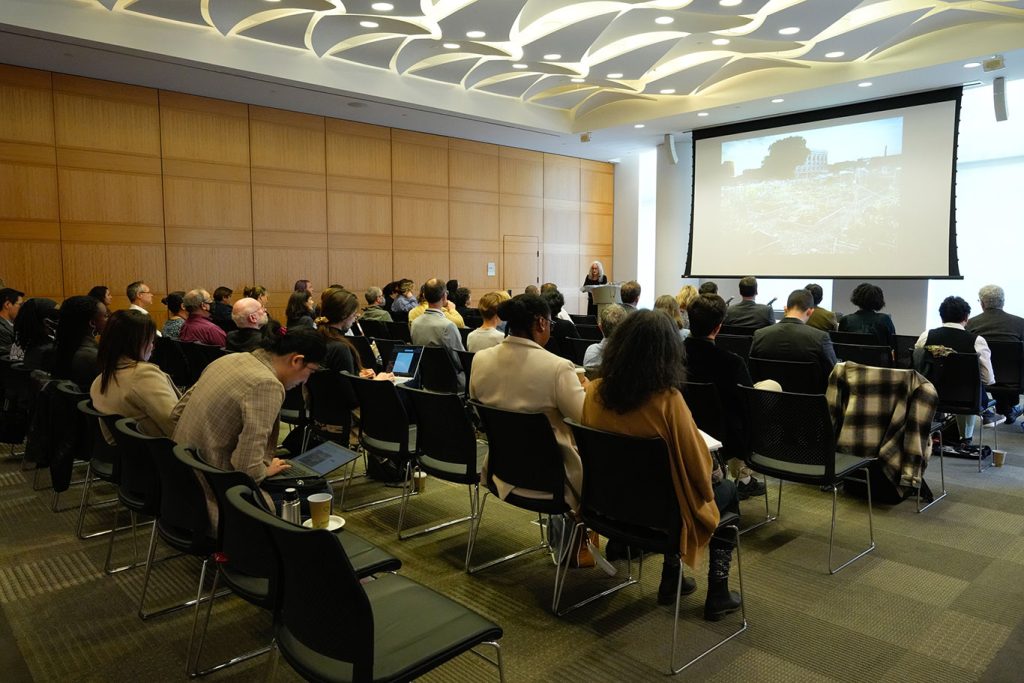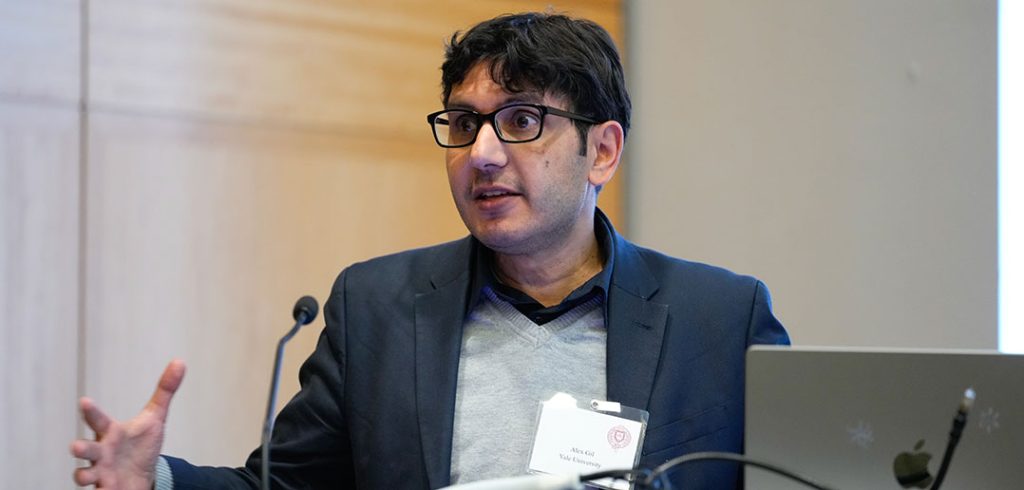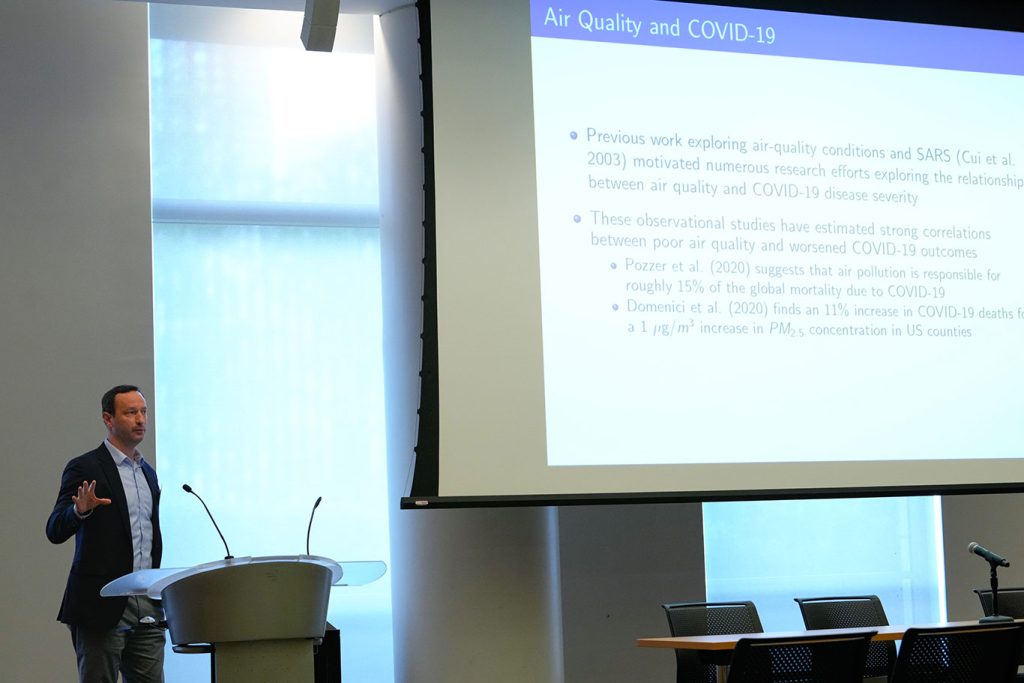Fordham hosted a wide-ranging, multi-disciplinary conference on May 1 and 2 at the Lincoln Center campus that addressed the sources of environmental degradation, racism, ableism, and rising inequality with regard to access to resources and information around the world.
In her welcoming remarks at the International Conference on Social and Environmental Justice, Fordham President Tania Tetlow noted that the conference’s goals were perfectly in sync with the four apostolic preferences of the Society of Jesus.
They are “walking with the excluded,” “caring for our common home,” “journeying with youth,” and committing to discernment, or “doing it all with openness and humility by listening and learning,” she said.
“My hope is that you will energize and inspire each other, that we will come up with the sorts of solutions that lie in the complexity, ” she said.
“And that we do it in a way that models that for our students because that is all about where we can locate the hope.”
The conference, which was organized by Fordham’s Office of the Provost, Office of Research, and Office of the Chief Diversity Officer, was supported by Fordham, Columbia University, Georgetown University, and New York University. Additional funding was provided by Fordham’s Office of the Chief Diversity Officer.
Ten-panel discussions followed two keynote addresses by Molly Doane, Ph.D., associate professor of anthropology at the University of Illinois-Chicago, and Alex Gil, Ph.D., senior lecturer II and associate research faculty at Yale University.

Community Gardens and Food Justice
Doane shared stories of working with three community gardens on the west, north, and south sides of Chicago, in a lecture titled “Climate Stories: Gardening at the City’s Edge in Chicago.” Far from simply being spots for food production, she said the gardens are beacons of hope for marginalized communities, including refugees from Iraq.
The Hello Howard Community Garden, where she is a member, contributes produce to a local food bank, even though yields can be uncertain.
“We gardeners donate to refugee programs for the same reason we flew to Lesbos to sort donated clothing in a warehouse after seeing a picture of that sweet little boy washed up on the shore there, the same reason we hang the ‘Hate Has No Home Here’ signs and the reason we flocked to O’Hare after refugees were detained after Trump signed the Muslim ban,” she said.
“I work in food not because it’s the be-all, end-all. It’s because it’s a tool to dismantle racism and create some racial equity and create living, thriving economies that people can control and have some sovereignty”
Minimal Computing and Access to Technology
In “Minimal Computing and Environmental Justice: A Humble Offering,” Gil shared the ways in which digital projects such as Open Syllabus, which has collected and analyzed 7.2 million college syllabi, and WAX, which helps researchers create digital archives, are making it easier to empower people who don’t have the same access to technology that is common in the United States, Europe, and Asia.
Minimal computing, which is a way of developing technology that can be used in the absence of hardware, software, network capacity, technical education, or even a reliable power grid, is one option.
“How do we do design if we don’t take for granted that everyone has fast, free internet, no censorship, and electricity all the time?” he said.
“Minimal computing tries to imagine constraints all over the world and designs for it.”

Environmental Economics, Justice, and Policy
In the panel Environmental Economics, Justice, and Policy, R. Jisung Park, Ph.D., assistant professor of economics at the University of Pennsylvania, showed how the increase in 90-degree days presents a greater risk of heat-related injuries than previously thought to those who work in jobs outside, as well as some who work in manufacturing.
Beia Spiller, director of the Transportation Program at Resources for the Future, made the case for greater public funding for electric vehicle charge stations in the Bronx.
And Marc N. Conte, Ph.D., a professor of economics at Fordham, shared the findings of a forthcoming paper, “Observational studies generate misleading results about health effects of air pollution: evidence from chronic air quality conditions and COVID-19 outcomes”. His study aimed to address the fact that in New York City, Black residents succumbed to COVID-19 in greater numbers than white residents.
Since the areas of the city where they live feature high ambient concentrations of air pollution, Conte wanted to see whether the two facts were connected. He concluded they are not, in part by analyzing phone data that showed that white, wealthy residents of the Upper East Side, which has similar levels of air pollution, may have been spared because they simply left the city during the pandemic.
“I’m not saying that Black and brown communities were not adversely affected by COVID. What I’m saying is, it wasn’t because they lived necessarily in areas with worse air quality,” he said.
“[P]eople in these communities had jobs that forced them to work in person. So they were actually here and present and exposed to this virus in a way that people in wealthier, whiter communities were not. I think that’s actually a larger systemic racism problem than an air quality issue.”

In the closing session, George Hong, Ph.D., Chief Research Officer and Associate Vice President for Academic Affairs at Fordham, hailed the gathering for bringing together perspectives from 13 different countries, representing nonprofit government organizations, academia, community groups, and private industry. Fordham has also been invited to publish the research presented in an upcoming issue of the academic journal Social Sciences.
The final session also featured remarks from Fordham professors Steven Franks, Ph.D., Nicholas Paul, Ph.D., Aseel Sawalha, Ph.D., and Sophie Mitra, Ph.D.
Franks highlighted the fact that so many participants conducted research in partnership with community organizations.
“This is getting out of the colonialist, or post-colonial mindset of sort of sweeping in to solve the problems of those people, and really just working with local communities to find out how we can all benefit from each other and solve problems together,” he said.
